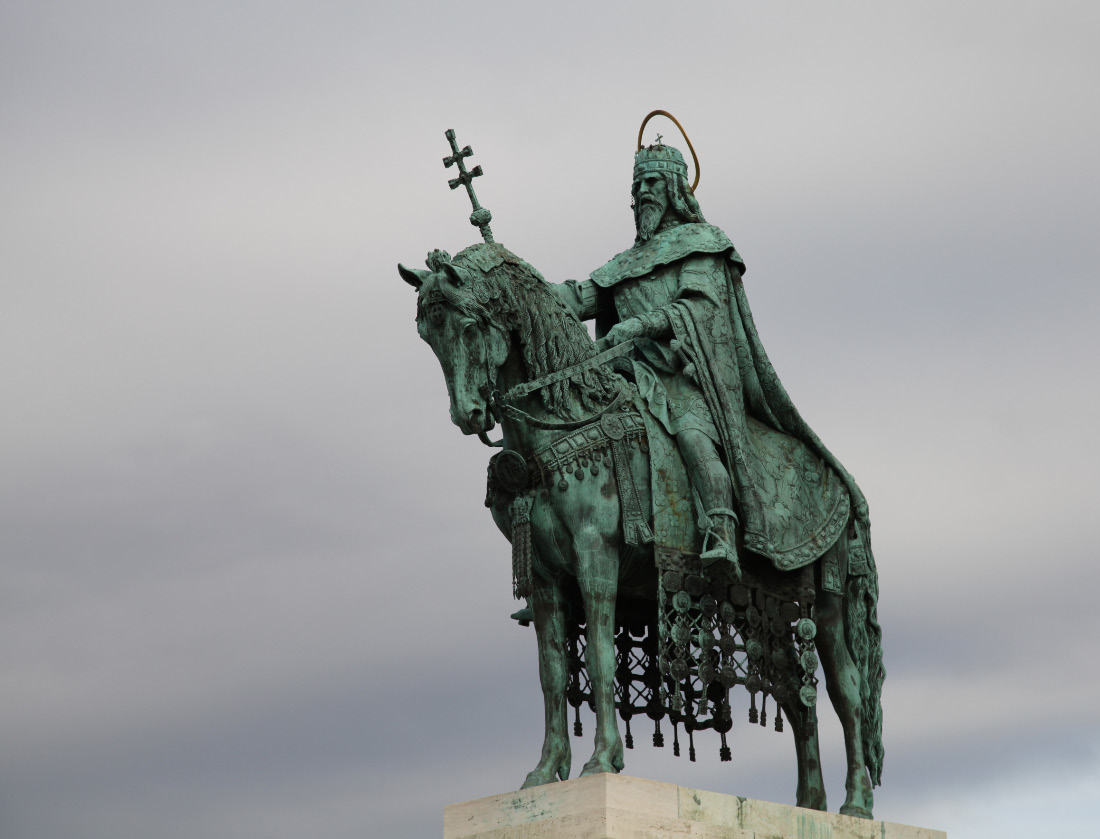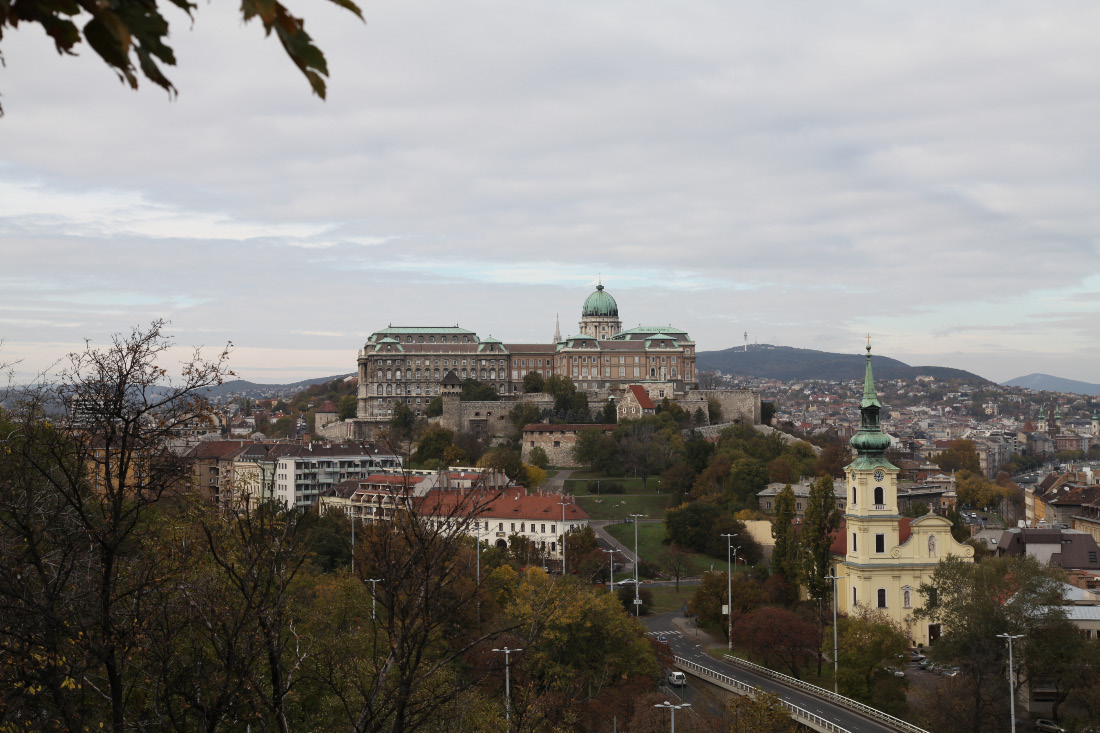Hungary
in combining subsidiarity with civilizational integrity one of the finest spiritual and cultural leaders of European Christendom
| |
 |
|
| |
I. István magyar király – Sanctus Stephanus rex Hungariae – King Saint Stephen I of Hungary |
|
| |
Atop the Budai Várnegyed – Castle Hill in Budapest, the Slovak-Hungarian sculptor Alajos Stróbl's magnificent equestrian bronze was finished in 1906, his subject having already ascended to the beatific vision nearly nine hundred years earlier. Having passed in 1038 Anno Domini, Saint-King Stephen was canonized in 1083. |
|
| |
 |
|
| |
Climbing up the Gellért Hill, a 30 October 2012 view of Budavári Palota – Buda Castle, made much nicer because it includes the Baroque-style (yellow) Church to the right, dedicated to ἡ Ἁγία Αἰκατερίνα ἡ Μεγαλομάρτυς – Catherine of Alexandria, Saint and Martyr – Alexandriai Szent Katalin (* c. 282 Alexandria Egypt – Alexandria c. 305 †). The hill itself is named for Szent Gellért – Gerard Sagredo, O.S.B., one of the Patron Saints of Hungary, martyred with Bystrik and Buldus on 24 September 1046 by being thrown from this hill during an anti-Christian revolt following King Saint Stephen's death in 1038. |
|
| |
|
|
| |
|
|
| |
|
Ego Sum Via Veritas et Vita – I am the Way the Truth and the Life |
|
|
| |
|
|
| |
Szent István-bazilika Budapest-Lipótváros – Saint Stephen's Basilica in Budapest-Lipótváros |
|
| |
Magyarország Alaptörvénye – the Fundamental Law, that is, the Constitution, of Hungary |
|
| |
|
|
| |
adopted on 18 April 2011, and entered into force on 1 January 2012 |
|
| |
|
|
| |
Isten, áldd meg a magyart! NEMZETI HITVALLÁS – God bless the Hungarians! NATIONAL AVOWEL |
|
| |
|
|
| |
[Preambulum és a kiválasztott részek, első magyar, majd angol fordításban –
Preamble and selected sections, first in Hungarian, followed by English translation] |
|
| |
|
|
| |
|
|
| |
MI, A MAGYAR NEMZET TAGJAI, az új évezred kezdetén, felelősséggel minden magyarért, kinyilvánítjuk az alábbiakat:
Büszkék vagyunk arra, hogy Szent István királyunk ezer évvel ezelőtt szilárd alapokra helyezte a magyar államot, és hazánkat a keresztény Európa részévé tette.
Büszkék vagyunk az országunk megmaradásáért, szabadságáért és függetlenségéért küzdő őseinkre.
Büszkék vagyunk a magyar emberek nagyszerű szellemi alkotásaira.
Büszkék vagyunk arra, hogy népünk évszázadokon át harcokban védte Európát, s tehetségével, szorgalmával gyarapította közös értékeit.
Elismerjük a kereszténység nemzetmegtartó szerepét. Becsüljük országunk különböző vallási hagyományait.
Ígérjük, hogy megőrizzük az elmúlt évszázad viharaiban részekre szakadt nemzetünk szellemi és lelki egységét.
Kinyilvánítjuk, hogy a velünk élő nemzetiségek a magyar politikai közösség részei és államalkotó tényezők.
Vállaljuk, hogy örökségünket, egyedülálló nyelvünket, a magyar kultúrát, a magyarországi nemzetiségek nyelvét és kultúráját, a Kárpát-medence természet adta és ember alkotta értékeit ápoljuk és megóvjuk. Felelősséget viselünk utódainkért, ezért anyagi, szellemi és természeti erőforrásaink gondos használatával védelmezzük az utánunk jövő nemzedékek életfeltételeit.
Hisszük, hogy nemzeti kultúránk gazdag hozzájárulás az európai egység sokszínűségéhez.
Tiszteljük más népek szabadságát és kultúráját, együttműködésre törekszünk a világ minden nemzetével.
Valljuk, hogy az emberi lét alapja az emberi méltóság.
Valljuk, hogy az egyéni szabadság csak másokkal együttműködve bontakozhat ki.
Valljuk, hogy együttélésünk legfontosabb keretei a család és a nemzet, összetartozásunk alapvető értékei a hűség, a hit és a szeretet.
Valljuk, hogy a közösség erejének és minden ember becsületének alapja a munka, az emberi szellem teljesítménye.
Valljuk az elesettek és a szegények megsegítésének kötelességét.
Valljuk, hogy a polgárnak és az államnak közös célja a jó élet, a biztonság, a rend, az igazság, a szabadság kiteljesítése.
Valljuk, hogy népuralom csak ott van, ahol az állam szolgálja polgárait, ügyeiket méltányosan, visszaélés és részrehajlás nélkül intézi.
Tiszteletben tartjuk történeti alkotmányunk vívmányait és a Szent Koronát, amely megtestesíti Magyarország alkotmányos állami folytonosságát és a nemzet egységét.
Nem ismerjük el történeti alkotmányunk idegen megszállások miatt bekövetkezett felfüggesztését. Tagadjuk a magyar nemzet és polgárai ellen a nemzetiszocialista és a kommunista diktatúra uralma alatt elkövetett embertelen bűnök elévülését.
Nem ismerjük el az 1949. évi kommunista alkotmányt, mert egy zsarnoki uralom alapja volt, ezért kinyilvánítjuk érvénytelenségét.
Egyetértünk az első szabad Országgyűlés képviselőivel, akik első határozatukban kimondták, hogy mai szabadságunk az 1956-os forradalmunkból sarjadt ki.
Hazánk 1944. március tizenkilencedikén elveszített állami önrendelkezésének visszaálltát 1990. május másodikától, az első szabadon választott népképviselet megalakulásától számítjuk. Ezt a napot tekintjük hazánk új demokráciája és alkotmányos rendje kezdetének.
Valljuk, hogy a huszadik század erkölcsi megrendüléshez vezető évtizedei után múlhatatlanul szükségünk van a lelki és szellemi megújulásra.
Bízunk a közösen alakított jövőben, a fiatal nemzedékek elhivatottságában. Hisszük, hogy gyermekeink és unokáink tehetségükkel, kitartásukkal és lelkierejükkel ismét naggyá teszik Magyarországot.
Alaptörvényünk jogrendünk alapja, szövetség a múlt, a jelen és a jövő magyarjai között. Élő keret, amely kifejezi a nemzet akaratát, azt a formát, amelyben élni szeretnénk.
Mi, Magyarország polgárai készen állunk arra, hogy országunk rendjét a nemzet együttműködésére alapítsuk. |
|
| |
|
|
| |
L) cikk
(1) Magyarország védi a házasság intézményét mint férfi és nő között, önkéntes elhatározás alapján létrejött életközösséget, valamint a családot mint a nemzet fennmaradásának alapját. A családi kapcsolat alapja a házasság, illetve a szülő-gyermek viszony.
(2) Magyarország támogatja a gyermekvállalást.
(3) A családok védelmét sarkalatos törvény szabályozza. |
|
| |
|
|
| |
R) cikk
(1) Az Alaptörvény Magyarország jogrendszerének alapja. (2) Az Alaptörvény és a jogszabályok mindenkire kötelezőek. (3) Az Alaptörvény rendelkezéseit azok céljával, a benne foglalt Nemzeti hitvallással és történeti alkotmányunk vívmányaival összhangban kell értelmezni. |
|
| |
|
|
| |
II. cikk
Az emberi méltóság sérthetetlen. Minden embernek joga van az élethez és az emberi méltósághoz, a magzat életét a fogantatástól kezdve védelem illeti meg. |
|
| |
|
|
| |
|
|
| |
|
|
| Christian Foundations of Hungary and of Europe Constitutionally enshrined. |
|
WE, THE MEMBERS OF THE HUNGARIAN NATION, at the beginning of the new millennium, with a sense of responsibility for every Hungarian, hereby proclaim the following:
We are proud that our king Saint Stephen built the Hungarian State on solid ground and made our country a part of Christian Europe one thousand years ago.
We are proud of our forebears who fought for the survival, freedom and independence of our country.
We are proud of the outstanding intellectual achievements of the Hungarian people.
We are proud that our people has over the centuries defended Europe in a series of struggles and enriched Europe’s common values with its talent and diligence.
We recognise the role of Christianity in preserving nationhood. We value the various religious traditions of our country.
We promise to preserve the intellectual and spiritual unity of our nation torn apart in the storms of the last century.
We proclaim that the nationalities living with us form part of the Hungarian political community and are constituent parts of the State.
We commit to promoting and safeguarding our heritage, our unique language, Hungarian culture, the languages and cultures of nationalities living in Hungary, along with all man-made and natural assets of the Carpathian Basin. We bear responsibility for our descendants; therefore we shall protect the living conditions of future generations by making prudent use of our material, intellectual and natural resources.
We believe that our national culture is a rich contribution to the diversity of European unity.
We respect the freedom and culture of other nations, and shall strive to cooperate with every nation of the world.
We hold that human existence is based on human dignity.
We hold that individual freedom can only be complete in cooperation with others.
We hold that the family and the nation constitute the principal framework of our coexistence, and that our fundamental cohesive values are fidelity, faith and love.
We hold that the strength of community and the honour of each man are based on labour, an achievement of the human mind.
We hold that we have a general duty to help the vulnerable and the poor.
We hold that the common goal of citizens and the State is to achieve the highest possible measure of well-being, safety, order, justice and liberty.
We hold that democracy is only possible where the State serves its citizens and administers their affairs in an equitable manner, without prejudice or abuse.
We honour the achievements of our historical constitution and we honour the Holy Crown, which embodies the constitutional continuity of Hungary’s statehood and the unity of the nation.
We do not recognise the suspension of our historical constitution due to foreign occupations. We deny any statute of limitations for the inhuman crimes committed against the Hungarian nation and its citizens under the national socialist and the communist dictatorship.
We do not recognise the communist constitution of 1949, since it was the basis for tyrannical rule; therefore we proclaim it to be invalid.
We agree with the Members of the first free National Assembly, which proclaimed as its first decision that our current liberty was born of our 1956 Revolution.
We date the restoration of our country’s self-determination, lost on the nineteenth day of March 1944, from the second day of May 1990, when the first freely elected organ of popular representation was formed. We shall consider this date to be the beginning of our country’s new democracy and constitutional order.
We hold that after the decades of the twentieth century which led to a state of moral decay, we have an abiding need for spiritual and intellectual renewal.
We trust in a jointly-shaped future and the commitment of younger generations. We believe that our children and grandchildren will make Hungary great again with their talent, persistence and moral strength.
Our Fundamental Law shall be the basis of our legal order; it shall be an alliance among Hungarians of the past, present and future. It is a living framework which expresses the nation’s will and the form in which we want to live.
We, the citizens of Hungary, are ready to found the order of our country upon the common endeavours of the nation. |
|
| |
|
|
| No "gay marriage" or celebration of sodomy in Hungary. |
|
Article L
(1) Hungary shall protect the institution of marriage as the union of a man and a woman established by voluntary decision, and the family as the basis of the survival of the nation. Family ties shall be based on marriage and/or the relationship between parents and children.
(2) Hungary shall encourage the commitment to have children.
(3) The protection of families shall be regulated by a cardinal Act. |
|
| |
|
|
| Reference to Christian foundations in Preamble made basis of interpretation of entire Constitution. |
|
Article R
(1) The Fundamental Law shall be the foundation of the legal system of Hungary.
(2) The Fundamental Law and legal regulations shall be binding on everyone.
(3) The provisions of the Fundamental Law shall be interpreted in accordance with their purposes, the National Avowal contained therein and the achievements of our historical constitution.
|
|
| |
|
|
| Abortion Constitutionally outlawed; some future atheist or Talmudic Jew judge can not enforce destruction of Christian families and Christendom through this means at least, not in Hungary. |
|
Article II
Human dignity shall be inviolable. Every human being shall have the right to life and human dignity; the life of the foetus shall be protected from the moment of conception. |
|
| |
|
|
|
| Rise, and have no fear. |
|
This is my beloved Son, with whom I am well pleased; listen to him. |
the Holy Spirit |
Man proposes, God disposes |
| |
|
Magyarország - Egyesült Európai Kereszténység |
| |
|
Hungary - United European Christendom |
|